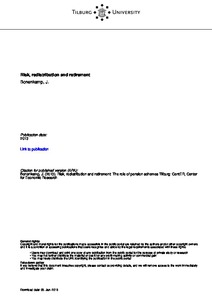Risk, redistribution and retirement : the role of pension schemes

Tilburg University. Department of Economics
Tilburg University - Tilburg
2014
253 p.
flexible retirement ; income redistribution ; pension scheme ; thesis ; welfare state
Social protection - Old age benefits
https://www.tilburguniversity.edu/research/institutes-and-research-groups/center/
English
Bibliogr.
"One of the main conclusions of this thesis is that collective pension funds are potentially welfare improving, even if contributions are distortionary and even if individuals face positively correlated wage and equity risks. By disconnecting individual contributions and benefits, the pension fund is able to smooth shocks over and beyond the life cycle of single generations. By adapting its investment policy to the risk-bearing capacity of the participants, the fund can in principle ensure that labour-supply distortions are overcompensated by risk-sharing gains. The thesis also contributes to the existing economic literature on portfolio and retirement choice. This literature argues that flexible retirement may serve as a hedge against unforeseen outcomes, justifying more risky asset portfolios during working life. The conclusion that emerges from the thesis is that this positive relation between risk taking and flexible retirement is weakened once uncertainty about labour income is recognized. Apart from facilitating risk sharing, collective pensions can also exploit the benefits of redistribution. Indeed, this thesis shows that introducing a flexible pension take-up can increase welfare if the initial pension scheme contains within-cohort redistribution."
Digital
The ETUI is co-funded by the European Union. Views and opinions expressed are however those of the author(s) only and do not necessarily reflect those of the European Union or the ETUI.